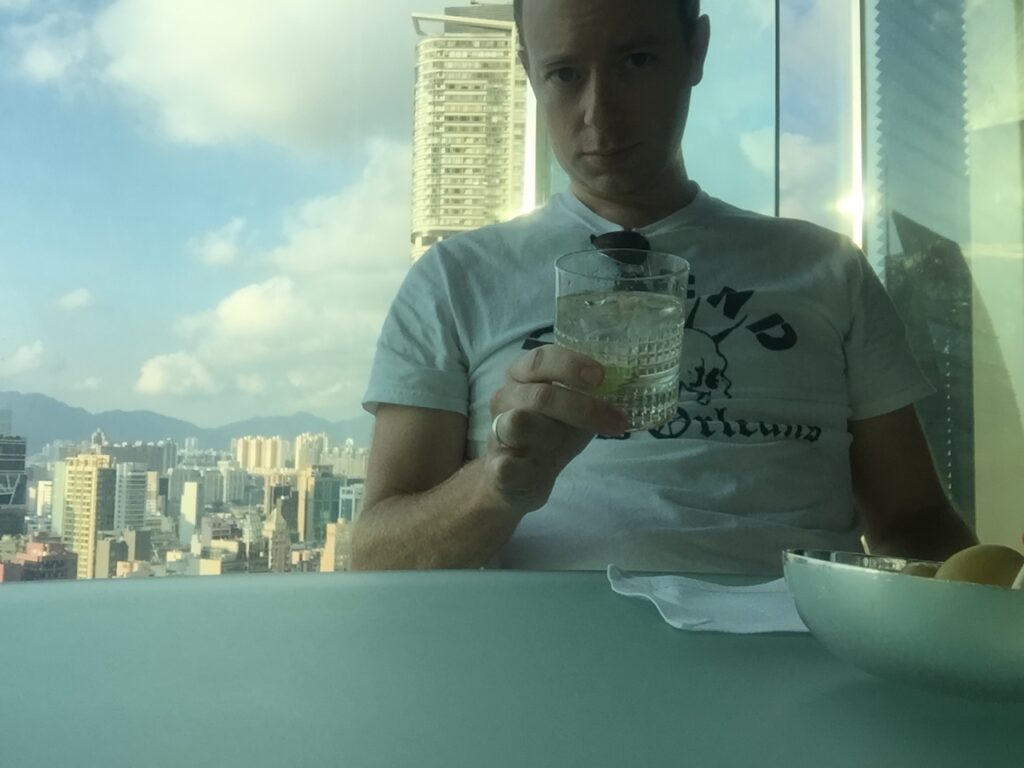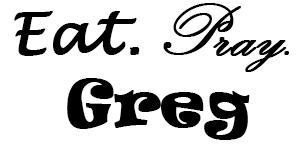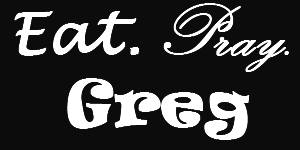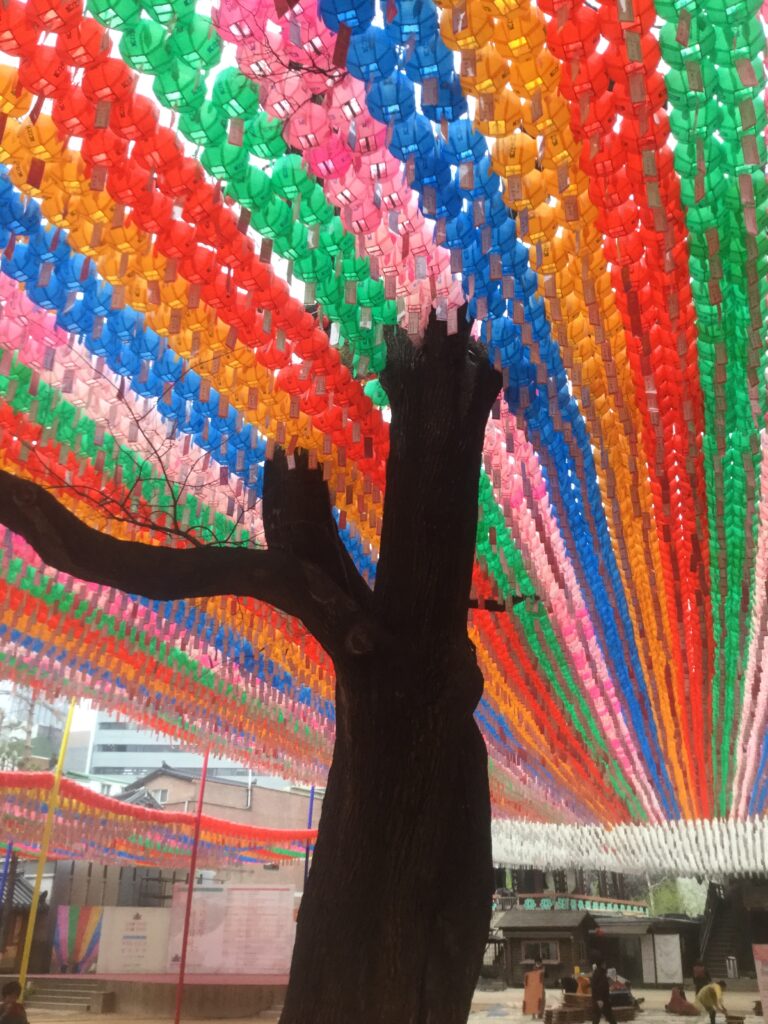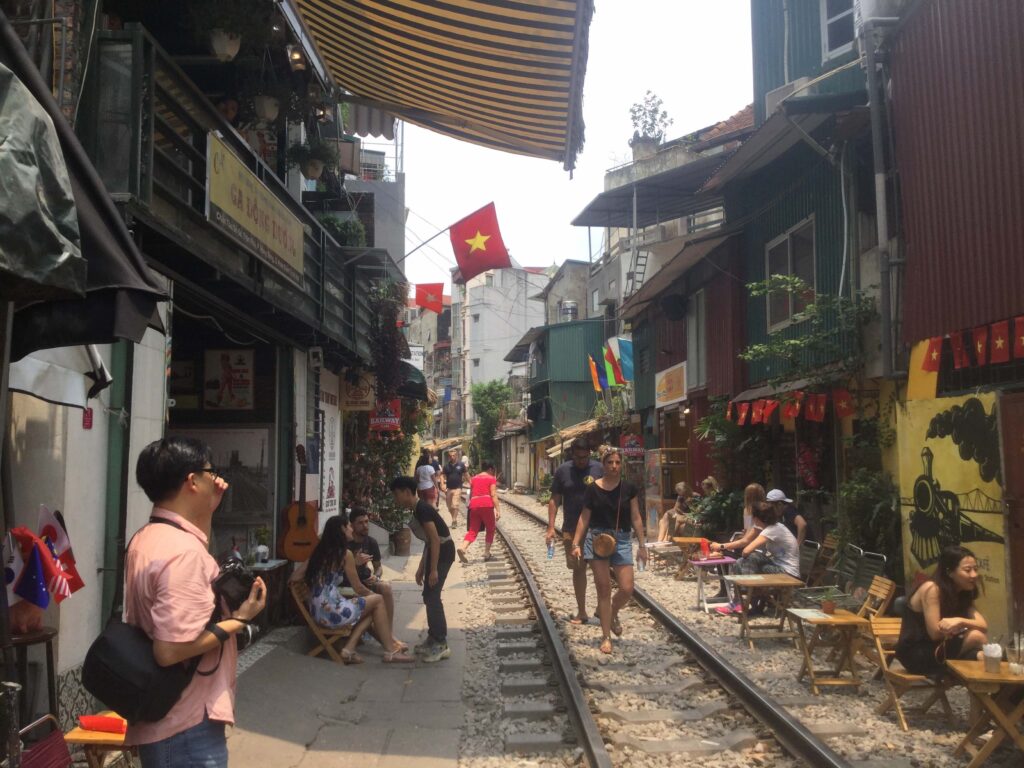 OK, so I overdid it a little last night. Considering I have been alone thus far on this trip, it was nice to kick back with friendly people. I headed to the airport early, as usual. In order to forgo the weight of extra baggage, I wore a lot of my clothes. By the time I arrived, I was a bit of a sweaty mess. As I had a few issues with my zipper on my bag and all my worldly possessions were contained in it, I bought a ridiculously expensive strap. The interesting thing about the Seoul Aiport is that they play up their futuristic aspect by having a robot wandering the terminal, asking if it can help weary passengers in a variety of languages. I think it started coming on to me when I took a selfie with it; it winked at me.
OK, so I overdid it a little last night. Considering I have been alone thus far on this trip, it was nice to kick back with friendly people. I headed to the airport early, as usual. In order to forgo the weight of extra baggage, I wore a lot of my clothes. By the time I arrived, I was a bit of a sweaty mess. As I had a few issues with my zipper on my bag and all my worldly possessions were contained in it, I bought a ridiculously expensive strap. The interesting thing about the Seoul Aiport is that they play up their futuristic aspect by having a robot wandering the terminal, asking if it can help weary passengers in a variety of languages. I think it started coming on to me when I took a selfie with it; it winked at me.
I boarded the plane after an uneventful security check and got into my seat. 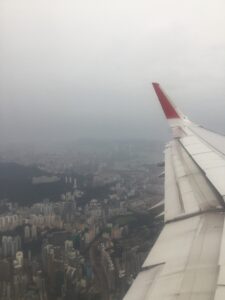 I immediately affixed my sleeping mask and passed right out. However, after what seemed like minutes, we began making our descent into Hong Kong through a storm. The turbulence shook the wings to the point it looked like they were going to snap off. As we continued our approach, I made my peace with God among wind sheer and craggy rock faces and began considering what will be put in my obituary. After what seemed like an eternity, our plane landed. The collective sigh and unclenching of every muscle of the passengers were quite audible.
I immediately affixed my sleeping mask and passed right out. However, after what seemed like minutes, we began making our descent into Hong Kong through a storm. The turbulence shook the wings to the point it looked like they were going to snap off. As we continued our approach, I made my peace with God among wind sheer and craggy rock faces and began considering what will be put in my obituary. After what seemed like an eternity, our plane landed. The collective sigh and unclenching of every muscle of the passengers were quite audible.
I deboarded, still riding that adrenaline high of a near-death experience, got my bags, and passed through customs. I figured the best way to get to the city was the connector train. I bought my ticket then got on. I secured my bags and took a seat by the window. The mountainscape was shrowded under fog and rain that gave it a macabre loveliness reminiscent of New Orleans. As the train sped to the city, I could see civilization on the horizon. I got off my train, then walked through Central Station to catch the Mass Transit Rail (MTR) Redline, to the stop right by my hostel, Tsim Sha Tsui. En transit, even with all my bags at rush hour, a little old lady got on the train with her cart of groceries. I motioned for her to take my seat. She motioned that she wanted me to keep it. I insisted, and she said in a kind of Chinese/British accent, “Thank you very much,” as she sat down.
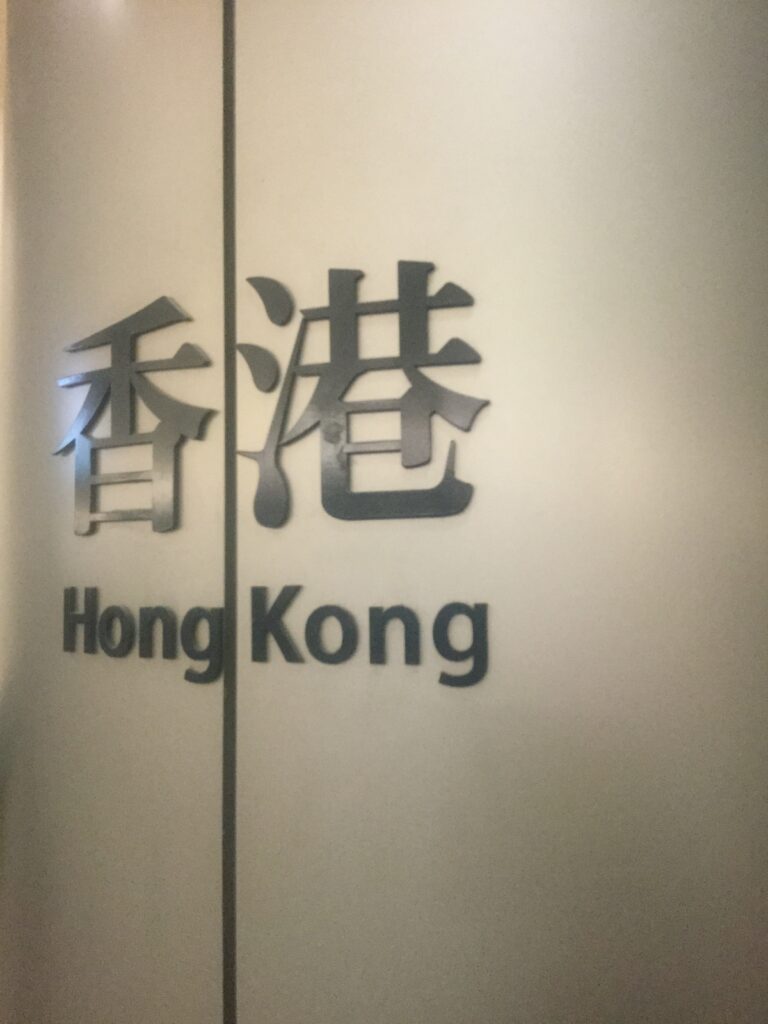
It was challenging to get my bearings as I was not able to connect to WiFi anywhere. After walking around in the already sweltering urban jungle climate of Hong Kong, I finally found the sign to my hostel. I did not realize it at the time, but where I was staying was only a stone’s throw from the Mira Hotel.
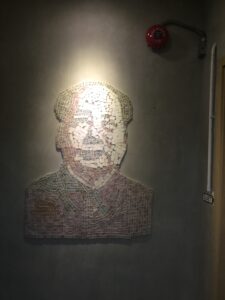
The Mira Hotel was significant in that in 2013; it was there where a young upstart digital spy disclosed to the world of the mass surveillance network within the United States. At the time, he figured under the watchful eye of the Chinese; Hong Kong would be safe from his own country’s prying eyes. The story of this young man and mine would intertwine once more, for when his story broke, he headed to Moscow where his US Passport was canceled, and he was forced to spend two weeks in the airport hotel. The same airport I traveled to on my way back from a fantastic wedding I attended in Italy as the cheapest flight back to the States went through Russia.
I found my hostel, dropped my bags, and headed out for dinner at a nearby restaurant. Of course, I got Chinese. I just pointed at the menu, and they brought out some noodles, some meat, and a lemon Coke. Now when I say lemon Coke, I mean a glass of Coke with half a lemon and enough salt to give an elephant hypertension. I guess it is because the heat causes everyone to sweat so much that it is an attempt to replenish those lost nutrients. I walked around my neighborhood a little, nestled among skyscrapers and stores, but was tired. I headed back to my hostel and went to sleep.
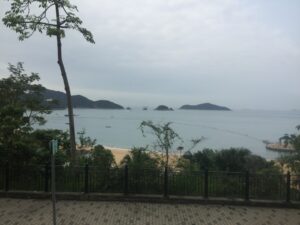 Awaking early the next day due to jetlag, I realized that I was already two months into my journey. I had already seen and experienced so much. I decided to take a bus tour of the city as there was a lot of ground to cover. I learned that I am situated on the Kowloon side of Hong Kong across the cleft of Victoria Harbour. Kowloon comes from Cantonese, the other major dialect of Chinese, which stands for nine dragons. This was the name given to the nine mountain ranges protecting the city. I took the morning hop-on, hop-off bus from the Hong Kong ferry terminus all around the city. I decided to take a ride on the longer, more comprehensive Green Line out to Stanley Plaza. I had never seen a city seem to use its inherent topography so well. Giant skyscrapers shot up in the valleys between mountains, while others were built directly into cliff faces. It was incredible. After taking a break and starring out into the South China Sea, I got back on the bus and headed into Honk Kong proper. On the ride back, they offered a little bit of history regarding Hong Kong.
Awaking early the next day due to jetlag, I realized that I was already two months into my journey. I had already seen and experienced so much. I decided to take a bus tour of the city as there was a lot of ground to cover. I learned that I am situated on the Kowloon side of Hong Kong across the cleft of Victoria Harbour. Kowloon comes from Cantonese, the other major dialect of Chinese, which stands for nine dragons. This was the name given to the nine mountain ranges protecting the city. I took the morning hop-on, hop-off bus from the Hong Kong ferry terminus all around the city. I decided to take a ride on the longer, more comprehensive Green Line out to Stanley Plaza. I had never seen a city seem to use its inherent topography so well. Giant skyscrapers shot up in the valleys between mountains, while others were built directly into cliff faces. It was incredible. After taking a break and starring out into the South China Sea, I got back on the bus and headed into Honk Kong proper. On the ride back, they offered a little bit of history regarding Hong Kong.
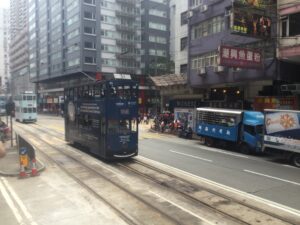
Apparently, the land was used as a Chinese bargaining chit after the Second Opium War with the British. Basically, it went like this: The Chinese had a lot of goods that the imperial British wanted. However, the Chinese had no need for what the British offered. That was until the British started trading opium with them. The Chinese wanted the British to stop selling drugs to their kingdom, so they attacked. China was not a world superpower at the time, while the British were. The Chinese were thoroughly trounced in the First Opium War, where they said they would give the Britsh the port city of Hong Kong if they promised not to invade the mainland. It took another Opium War for the British to agree that instead of taking the colony outright, they would “lease” it for 99 years. This was in 1898.
When the Japanese invaded during World War II, the colony was held for two weeks by the British; then there was a formal surrender in the poshest hotel in the city. The surrender was signed at the Peninsula Hotel in suite 336, their newly acquired Japanese headquarters. The scene from the Dark Knight, where Lucious Fox talks with Wang in Hong Kong, was filmed in room 316.
When 1997 came around, Hong Kong returned to the Chinese. However, it was allowed to be a Special Administrative Region, much like its colonial Portuguese half-sister, Macau. This meant that it had a degree of autonomy and would fall under the One Country, Two Systems guidelines supposedly until 2047, when it returned to full Chinese control.
Other fun facts include that there are twice as many skyscrapers in Hong Kong than there are in New York City. The most amazing and terrifying thing I saw is that they use unsupported bamboo scaffolding twenty stories in the air!
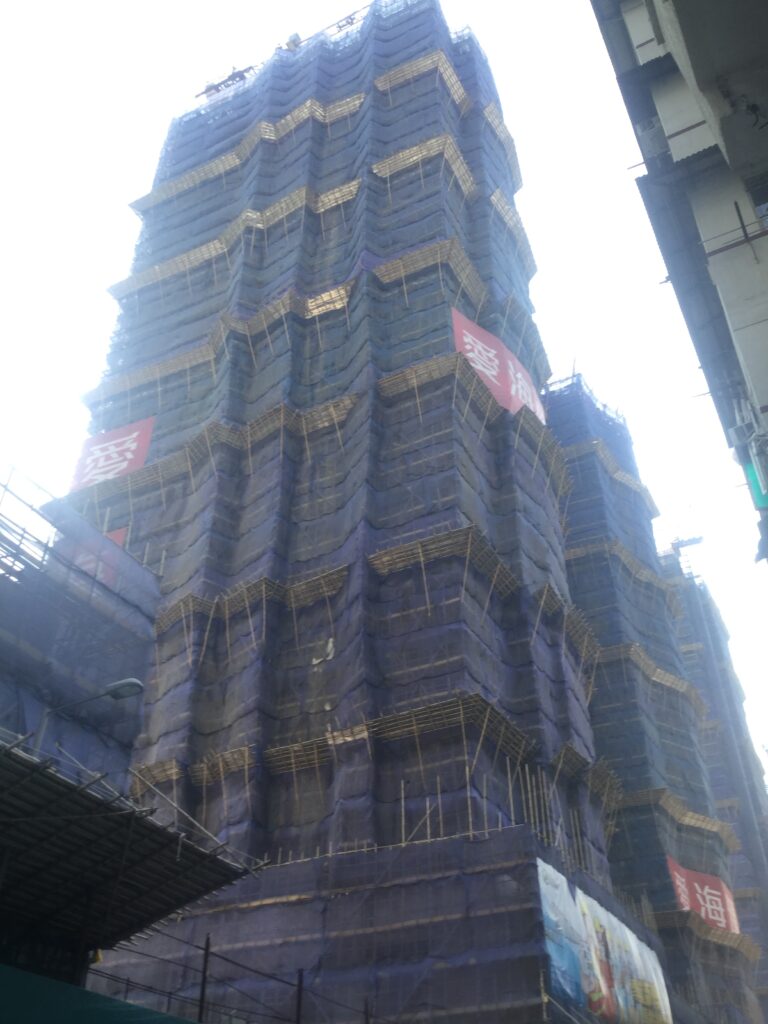
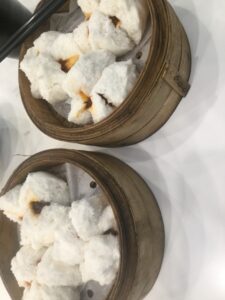 Since it was Easter, I decided to go get my favorite Chinese dish, barbecued pork bao, as well as some fried shrimp dumplings as a way to celebrate the holiday.
Since it was Easter, I decided to go get my favorite Chinese dish, barbecued pork bao, as well as some fried shrimp dumplings as a way to celebrate the holiday.
After dinner, I walked the Avenue of the Stars, located on the Kowloon side of the harbor front. It is like the concrete molds in front of Mann’s Chinese Theatre in Hollywood, where the stars of Hong Kong placed their hands in bronze. It was crowded, so I made sure to find out where the crowds were to make sure I saw who they were gathered by. I saw Jackie Chan, John Woo, and of course, the most famous son of Hong Kong, Bruce Lee. He is even commemorated in a statue.
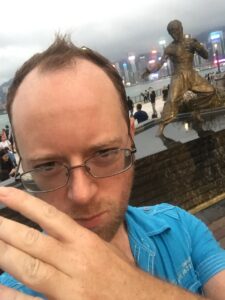
I waited at the waterfront as I heard a rumor that there was a light show every day at 7 pm. I was thoroughly unprepared for what happened next. As the countdown clock began across the harbor, loudspeakers began to come alive. In my entire life, I never thought I would see architecture dance. In a synchronous light, laser, and music show, the Hong Kong skyline buildings blinked, moved, and sang in unison for about 30 minutes. While the rest of the world was living in 2019, Hong Kong was living in 2049.
The next day, I woke up and decided to take a walking tour. And holy shit, am I glad I did. I met Terry, my guide, in some non-descript hotel lobby. We waited for a few more people to arrive. To begin his tour, he made several things very clear: First, that it would not be some namby, pamby walking tour that gives glowing facts about the city only to drop us off at some tourist trap where he gets a commission. Second, he would give us real opinions about life in Hong Kong: how it was, how it is, and where it is going. Third, any and every question we had, we should ask, and he would give us an answer to the best of his ability. As someone that always asks the hard questions on my tours, I appreciated his candor.
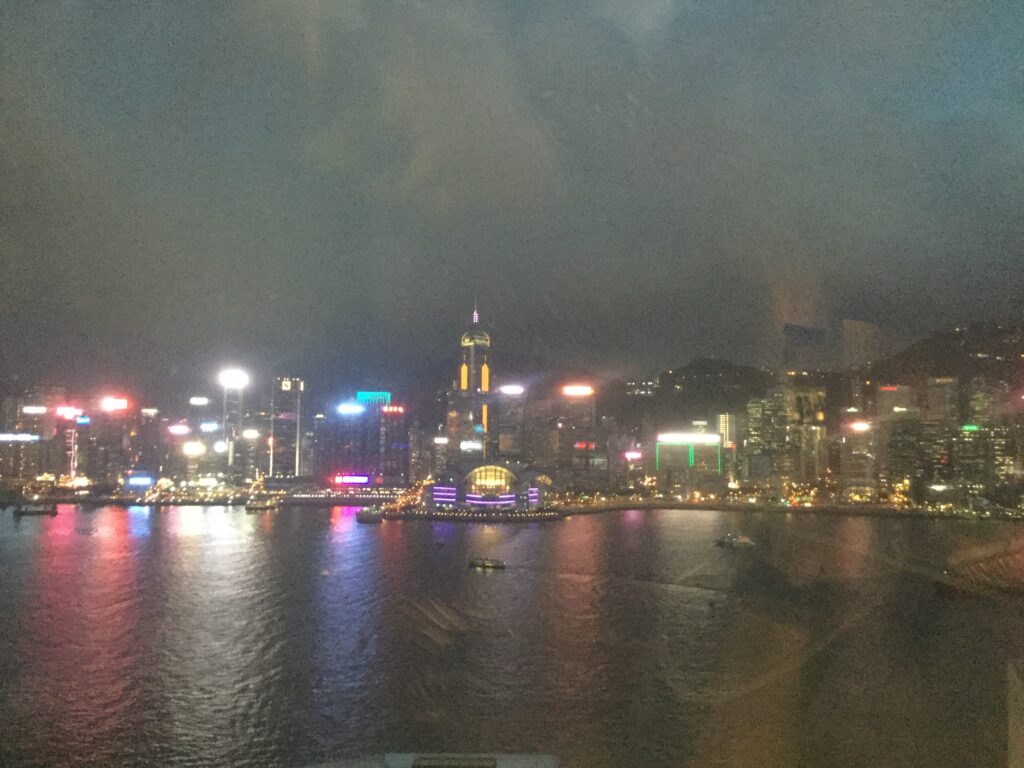
 The first thing I learned about Hong Kong was that it was freer than I thought. I realized this when Terry took our entire group and sat us down outside the Gin Bottle, the name that the residents of Hong Kong gave to the once British Army barracks that now housed members of the Chinese People’s Liberation Army. As we sat, no doubt being monitored by the multiple CCTV cameras as well as microphones, Terry told us about Tiananmen Square. For the unfamiliar, Tiananmen Square was a protest that occurred in China in 1989. This student movement, protesting for democracy, was brutally repressed. The same army listening to our tour guide that was only a few feet away shot into the crowd, and slew thousands. If you know the iconic image of Tank Man, that happened during this time. Since this topic was verboten in China, Terry said that he will know he no longer lives in a free country the day he is arrested for speaking about this atrocity.
The first thing I learned about Hong Kong was that it was freer than I thought. I realized this when Terry took our entire group and sat us down outside the Gin Bottle, the name that the residents of Hong Kong gave to the once British Army barracks that now housed members of the Chinese People’s Liberation Army. As we sat, no doubt being monitored by the multiple CCTV cameras as well as microphones, Terry told us about Tiananmen Square. For the unfamiliar, Tiananmen Square was a protest that occurred in China in 1989. This student movement, protesting for democracy, was brutally repressed. The same army listening to our tour guide that was only a few feet away shot into the crowd, and slew thousands. If you know the iconic image of Tank Man, that happened during this time. Since this topic was verboten in China, Terry said that he will know he no longer lives in a free country the day he is arrested for speaking about this atrocity.
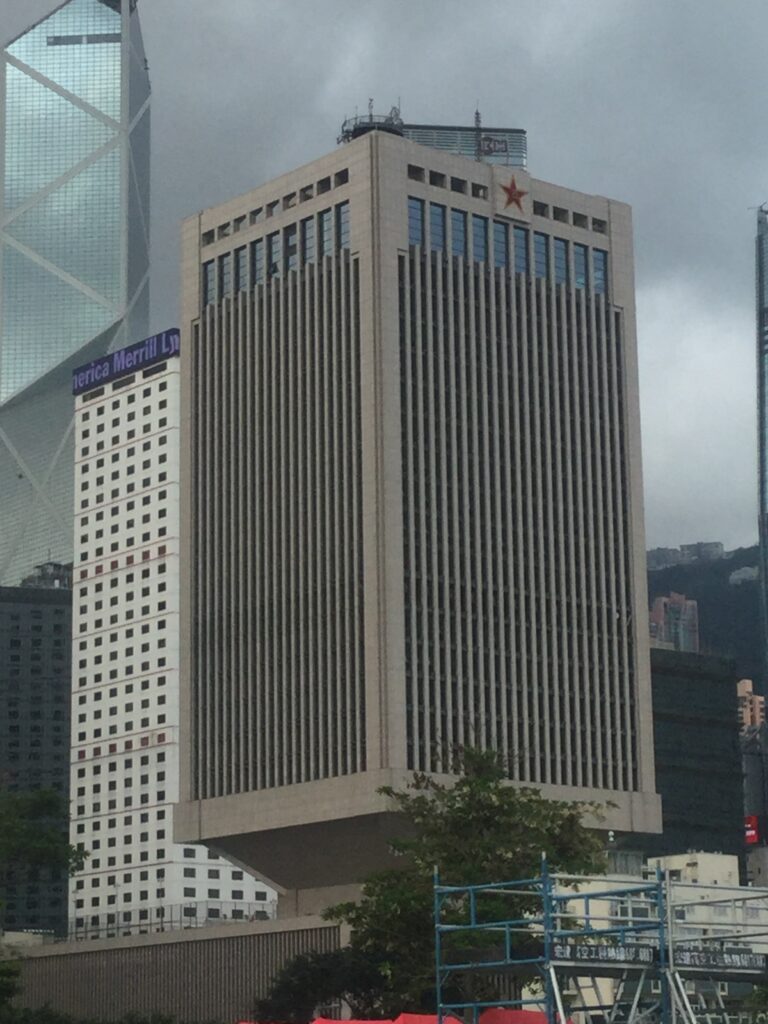
The second thing I learned is that the Chinese are putting billions of dollars into real estate in Hong Kong. This is done for a variety of reasons. The first is that the newly rich of China know that to keep their monies from the Communist horde, they better not keep it local. By buying immovable assets, they are able to store their wealth and even generate income that they do not report. In Hong Kong, they do this by bribing government officials. Much like Singapore, one does not own their property but merely leases it from the government. The scheme is that they are buying buildings seeded from the government that are a few decades old, then buying out 80% of the residents. The law states that the remaining 20% need to sell their rights. Then the Chinese either renovate or knock it down, padding the construction or demolition costs. Next, they rebuild and increase the rents or put the purchase price so high that the people that once lived in the building cannot afford it.
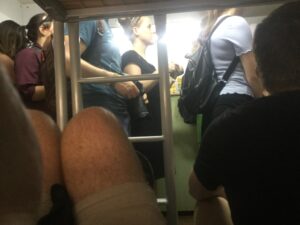 This practice has lead to a lot of homelessness. It also lead to people crowding into illegal partitioned apartments, creating illegal rooftop apartments, or living in “Cage Houses.” The homeless problems I did not really witness while walking the streets of Hong Kong. However, Terry did take us to an illegal partitioned apartment where a family of 5 lived. This was originally one apartment that was subdivided into four. The ceiling was only about 5’10”, which meant I had to duck and watch my head as exposed pipes and wires were all about. There was only enough room for a bunk bed and a refrigerator. Crowding in our whole group only added to the claustrophobia. As burglary was rampant, there were bars on the window, creating an awful fire hazard. Illegal apartments were made on rooftops of the skyscrapers. Since the city’s sweltering heat was pernicious, people could not go back to their un-airconditioned, metal shedlike rooftop dwellings until it cooled down enough, which was around 10 pm. The Cage Houses were like the very hostel bunk bed I was sleeping in. However, the difference was that they were usually 4 stories tall, made of corrugated wire, and filled with all the worldly possessions of the inhabitant that would hang on the wires, like a sarcophagus. Terry showed us pictures, and I could not believe people could live like this.
This practice has lead to a lot of homelessness. It also lead to people crowding into illegal partitioned apartments, creating illegal rooftop apartments, or living in “Cage Houses.” The homeless problems I did not really witness while walking the streets of Hong Kong. However, Terry did take us to an illegal partitioned apartment where a family of 5 lived. This was originally one apartment that was subdivided into four. The ceiling was only about 5’10”, which meant I had to duck and watch my head as exposed pipes and wires were all about. There was only enough room for a bunk bed and a refrigerator. Crowding in our whole group only added to the claustrophobia. As burglary was rampant, there were bars on the window, creating an awful fire hazard. Illegal apartments were made on rooftops of the skyscrapers. Since the city’s sweltering heat was pernicious, people could not go back to their un-airconditioned, metal shedlike rooftop dwellings until it cooled down enough, which was around 10 pm. The Cage Houses were like the very hostel bunk bed I was sleeping in. However, the difference was that they were usually 4 stories tall, made of corrugated wire, and filled with all the worldly possessions of the inhabitant that would hang on the wires, like a sarcophagus. Terry showed us pictures, and I could not believe people could live like this.
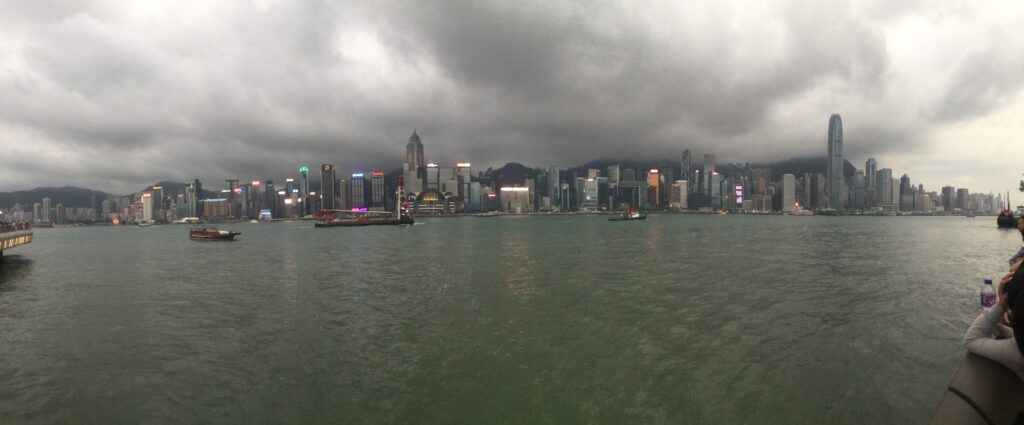
The third fact is that the CEO of Hong Kong (that is the real title for the head of their government) is selected from a list of about 1200 people that have been OK’ed by the Chinese Communist Party. This from a county of about 8 million. Terry talked about the umbrella protests in 2014 that resulted in some reforms. But not many.
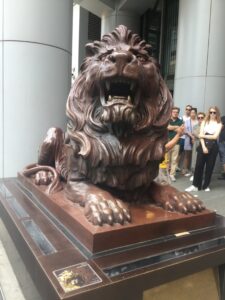 Fourth is that the Hong Kong Dollar is directly pegged to the US Dollar in a ratio of about 4 to 1. That means that somewhere in Hong Kong, there is a reserve of American dollars. Also, on the topic of money, 3 private banks print their currency except for their 10 note. Terry took us to one, The Hongkong Shanghai Banking Corporation, better known as HSBC, where he introduced us to their mascot lion sculptures: Stephan and Stitt. These cats had seen a lot, including being pox-marked by Japanese bullets and shrapnel during the Battle of Hong Kong.
Fourth is that the Hong Kong Dollar is directly pegged to the US Dollar in a ratio of about 4 to 1. That means that somewhere in Hong Kong, there is a reserve of American dollars. Also, on the topic of money, 3 private banks print their currency except for their 10 note. Terry took us to one, The Hongkong Shanghai Banking Corporation, better known as HSBC, where he introduced us to their mascot lion sculptures: Stephan and Stitt. These cats had seen a lot, including being pox-marked by Japanese bullets and shrapnel during the Battle of Hong Kong.
With our day coming to an end, I wholeheartedly thanked Terry for all the knowledge he shared, gave him some appreciation coupons, and then headed back to my hostel. I got some noodles and then headed to bed. I was going to add another unplanned country to my tour the next day.
I woke up early after some weird dreams involving former coworkers and figured out the best way to head to Macau. In 1557, Macau became a trading post for the second nautical superpower of the time, Portugal. The Chinese sure liked their leases, so they leased this area to Portugal until the 19th Century. When Britain became the new power in the region, Portugal tried maintaining ownership of the de facto colony. China kind of relented but kept autonomous authority. Finally, in 1999, Portugal ceded Macau’s claims back to China, thus ending outright European colonialism in Asia.
Macau was about an hour boat ride from Hong Kong. I got turned around a little when trying to find the ferry dock, but I was able to secure a ticket. Since I was leaving Hong Kong, I needed to get a special ticket for my passport, but since I was going to another Special Autonomous Region, I did not need to get it stamped. I hopped on the ferry, took my seat, and watched the impossibly blue water go by. I arrived in Macau and was amazed about how much it was like a Portuguese Hong Kong. Signs were in Portuguese and Chinese, like how they were in English and Chinese in Hong Kong.
After the Portuguese left, Macau, due to its proximity and SAR status, knew what it had to do with the Chinese Nouveau Riche; take their money. This became the Las Vegas of Asia with casinos, hotels, and shopping. When I got to the terminal, I took a free taxi to the Crowne Plaza hotel, where I would not be staying. I needed to use the restroom, and thankfully due to my couple hours of Chinese language learning, I knew what symbol meant ‘male’ and headed in. It is 男 by the way (女 is female.) After my little practically applied language skills lesson, I began walking toward the city center.
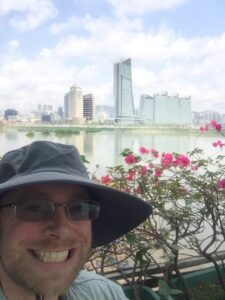
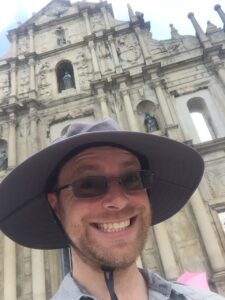 First, however, I stopped at as close as I ever wanted to get to China. The border control building looked so foreboding as if to say, “Abandon All Hope Ye Who Enter Here“. Since I was in a new country, I needed to find and send a postcard for my nephews, which was difficult as no one would take credit cards. I found a change house, swapped out Hong Kong dollars for some Macau Patacas, then strolled along a touristy street until I found a place to buy postcards. After that, I walked to the ruins of St. Paul church, sat down, wrote out the postcard while sipping an ice tea. The ruins were from the Portuguese influence on the area and were built by the Jesuits in the early to mid 17th Century. However, as Macau began losing out to Hong Kong as the main port of the area, the influence of the Portuguese continued to decline. The complex caught fire in 1835 and subsequently fell into ruin, only leaving the Church’s facade.
First, however, I stopped at as close as I ever wanted to get to China. The border control building looked so foreboding as if to say, “Abandon All Hope Ye Who Enter Here“. Since I was in a new country, I needed to find and send a postcard for my nephews, which was difficult as no one would take credit cards. I found a change house, swapped out Hong Kong dollars for some Macau Patacas, then strolled along a touristy street until I found a place to buy postcards. After that, I walked to the ruins of St. Paul church, sat down, wrote out the postcard while sipping an ice tea. The ruins were from the Portuguese influence on the area and were built by the Jesuits in the early to mid 17th Century. However, as Macau began losing out to Hong Kong as the main port of the area, the influence of the Portuguese continued to decline. The complex caught fire in 1835 and subsequently fell into ruin, only leaving the Church’s facade.
I continued walking and came across several hotels and casinos that were simply amazing. Probably the most fantastic building I had ever seen since La Sagrada Familia was the Hotel Lisboa. It was a giant golden lotus (much like what is on Macau’s flag) jutting up into the sky. I then went inside the Wynn hotel just in time for the show. Words cannot describe the opulence in motion. As it was getting later in the day, I knew it was time to start heading back. I went to the ferry terminal, mailed my postcards, got some sort of creme-filled pastry, and headed back to Hong Kong. I arrived back in the hostel and needed to start filling out my paperwork for Vietnam. They want a lot of information: Relatives, where they live, my job, where it is, where I live, etc. I got some more dinner, then shaved and showered. Going to do laundry tomorrow.
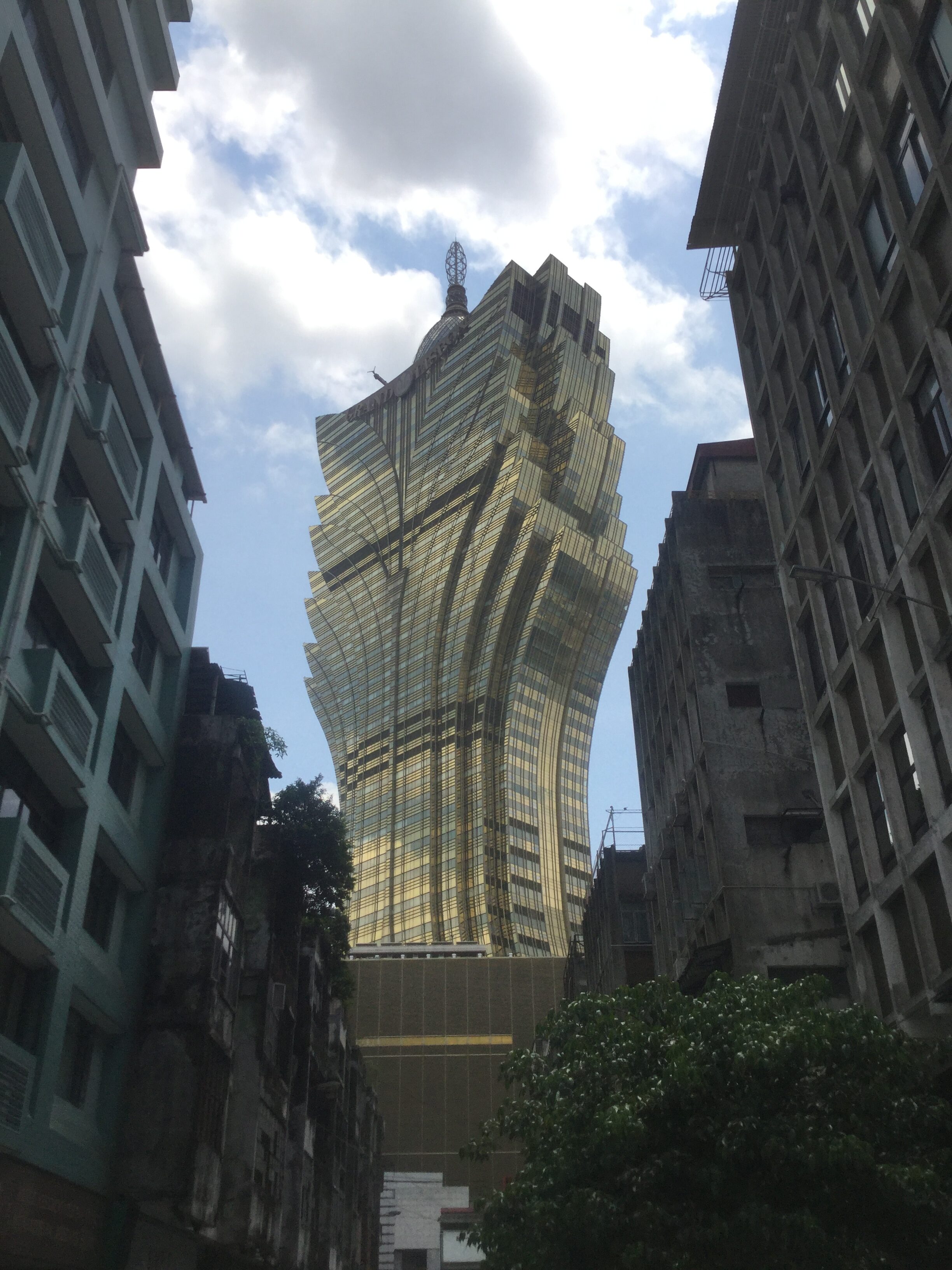
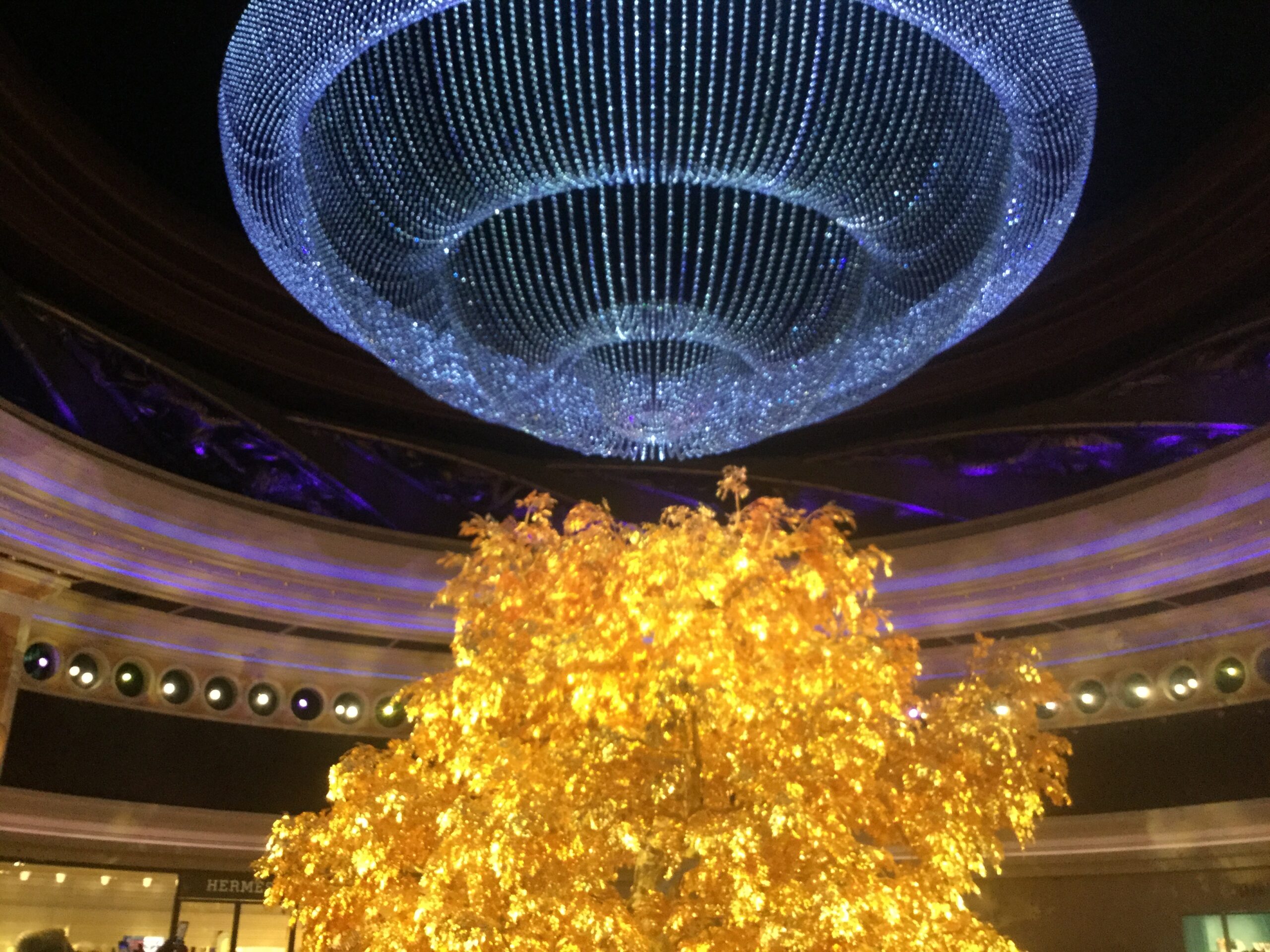
The next day, I woke up and decided it was time to have a relaxing day from all the city’s sweltering heat. As I was leaving the hostel, I noticed the person working at the desk of the hostel was sleeping in the lounge. Based on what Terry was saying, I can understand why. Anyway, I made my way to the mall, purchased my ticket, and sat down for the opening day screening of Avengers: Endgame. It was an experience. When one of the main characters died, the whaling in the theatre was deafening. Men cried. Women cried. Children cried. It was something to be in the middle of that crowd catharsis and made me more cognizant of what I call our human universals: we all laugh, we all love, we all feel loss.
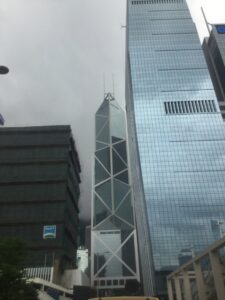
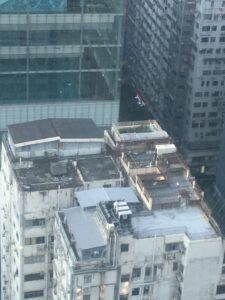 I returned to my hostel and got my entry paperwork to Vietnam in order. I then headed out to climb the Bank of China building. Unfortunately, Terry’s information was not accurate as they did not offer any more tours. I instead headed to the International Finance Center building and learned more about Hong Kong’s monetary policy. A curious thing happened on my ride down; just like how there are few to no 13th floors in American buildings, the Chinese do it differently. Apparently, the number 4 in Chinese sounds very close to the word “death,” so the number 44 is a double dose of bad luck. So, most of the skyscrapers in Chinese speaking countries do not have that floor. Again, more human universals.
I returned to my hostel and got my entry paperwork to Vietnam in order. I then headed out to climb the Bank of China building. Unfortunately, Terry’s information was not accurate as they did not offer any more tours. I instead headed to the International Finance Center building and learned more about Hong Kong’s monetary policy. A curious thing happened on my ride down; just like how there are few to no 13th floors in American buildings, the Chinese do it differently. Apparently, the number 4 in Chinese sounds very close to the word “death,” so the number 44 is a double dose of bad luck. So, most of the skyscrapers in Chinese speaking countries do not have that floor. Again, more human universals.
Since it was now later, I decided it was cocktail hour and headed to the top of the Peninsula Hotel and took in all of Hong Kong while sipping the drink of my wayward youth, a double of Havana Club 3 Year. From my vantage point, I could see the city sprawled before me with all its duality: There were people partying on a rooftop bar in a building next to a family hanging laundry on an illegal rooftop apartment. The irony was not lost. I finished my drink, got my laundry, then headed back to my hostel. For the next day, I was shipping off to Vietnam.
